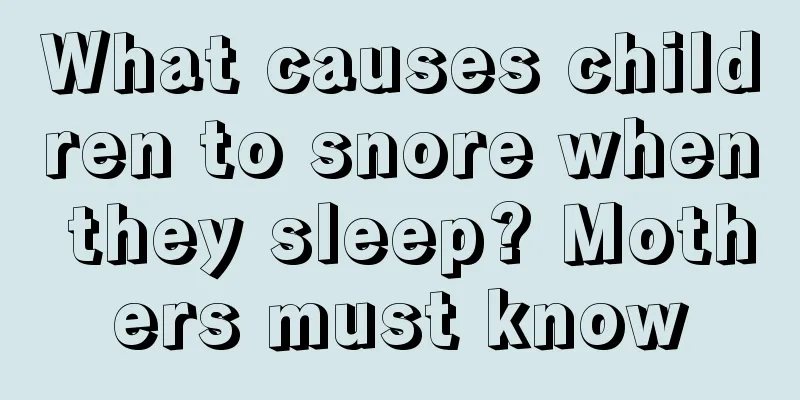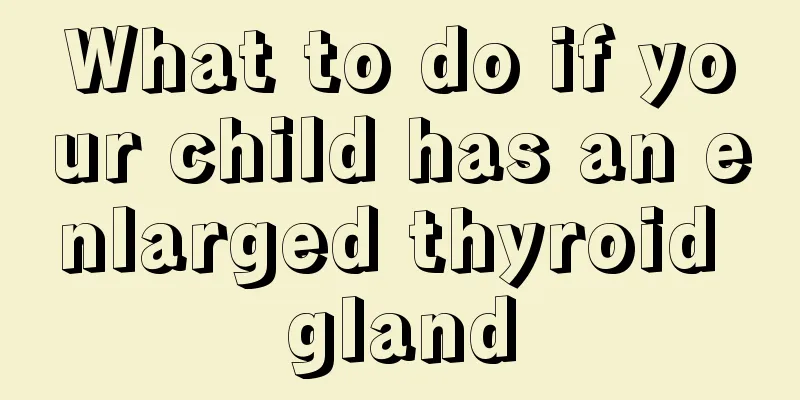What should I do if my baby’s feet sweat a lot? Parents should remember these methods

|
It is not common for babies' feet to sweat easily, but if it happens, parents need to pay attention to it, because the baby is in the developmental stage, and if there is a problem with the body, the impact will be great. Only by solving the problem in time can the impact on the baby's body be reduced. 1. Babies with physiological hyperhidrosis Sweating is a kind of nerve reflex in the body. Because babies are in the stage of growth and development, their physiological metabolism is vigorous and the regulatory function of the nervous system is not very sound, so they sweat a lot. This is medically called physiological hyperhidrosis. Babies with this kind of physiological hyperhidrosis will sweat more obviously in the following situations, such as in summer, when the baby wears too many or too tight clothes, when the baby is active, when eating hot food, or when the baby is nervous or scared. If your baby has no other abnormal symptoms, that is, it is physiological hyperhidrosis. Such babies sweat a lot, not because of physical weakness. Parents do not need to worry and no special medication is needed. Countermeasures: Parents need to take good care of babies who sweat a lot, including: (1) Babies should drink more water; (2) Cultivate the baby's ability to adapt to the environment in life, such as wearing loose clothes and not using too thick bedding; (3) Change your baby’s clothes frequently, bathe him/her more often, and ensure his/her skin is clean; (4) Pay attention to education and do not spoil the baby. This is not only beneficial to the baby's mental development, but also can accelerate the improvement of the baby's nervous system regulatory function. In addition, babies who sweat excessively for a long time will lose zinc in their sweat, so they need to consciously increase the intake of zinc-rich foods, such as eggs, meat, liver, beans and peanuts, to meet the zinc needs for their growth and development. If your baby shows symptoms such as anorexia, slow weight and height gain, you should see a doctor and use zinc-containing drugs under the doctor's guidance. Generally, zinc gluconate has fewer side effects and is easier for babies to accept. Note that calcium supplements will prevent the absorption of zinc in the intestines; many babies take various calcium supplements preventively, and zinc supplements should be avoided at the same time as calcium supplements. 2. Babies with rickets and excessive sweating In addition to the baby's physiological hyperhidrosis, hyperhidrosis caused by rickets is also a common cause in infants and young children. Infants and young babies need 400~800IU of vitamin D every day. If they do not get enough sunlight and do not supplement vitamin D food in time, they are likely to suffer from vitamin D deficiency. In addition, babies grow and develop rapidly, so vitamin D deficiency will cause rickets. Babies with rickets will show symptoms of irritability, crying, and restless sleep; they will sweat a lot, especially on the head, but it has nothing to do with climate. In addition to excessive sweating, babies with rickets also have skeletal deformities, such as square skull, wide fontanelle, delayed closure; delayed teething, flared ribs, bracelets or anklets, etc. Babies with rickets and excessive sweating need to treat rickets to solve the problem of excessive sweating. Countermeasures: 1. Vitamin D and calcium treatment must be carried out under the guidance of a doctor. After the treatment is completed, measures to prevent rickets can be taken, such as adding foods rich in calcium and vitamin D to the baby, such as egg yolks, animal livers, dairy products, etc.; 2. Make sure your baby gets more sun exposure. Babies under 2 years old need to supplement 400 IU of vitamin D and about 600 mg of calcium every day (pharmacy has vitamin D preparations and calcium preparations specifically for babies) to meet the needs of rapid growth and development. 3. Other care requirements for babies with rickets and hyperhidrosis are the same as those for babies with physiological hyperhidrosis. 3. Hyperhidrotic babies who need special attention Physiological hyperhidrosis and rickets-related hyperhidrosis are the most common in infants and young children, but there are some rare conditions, such as tuberculosis, chronic infection lesions, parasitic infections, anemia, hyperthyroidism, and even tumors. Hyperhidrosis is a concomitant manifestation of these diseases and parents should pay attention to them. In addition to hyperhidrosis, babies with the disease may also have low-grade fever, weight loss or emaciation, sallow complexion, rash and other manifestations. If parents find any of these symptoms in babies with hyperhidrosis, they should take their babies to see a doctor in time to avoid delaying diagnosis and treatment of the disease. |
<<: What are the dangers of hypertrophic sinusitis in children?
>>: What causes excessive eye secretions in children? Reveal the reason for you
Recommend
What happens if I take a shower after getting the vaccine?
In fact, in this society, due to various reports ...
What should children pay attention to during chickenpox?
Chickenpox often occurs between the ages of 3 and...
Is it really good for children to drink pure milk?
Parents are naturally more worried about the nutr...
Black streaks in baby's stool
We all know that babies cannot eat many foods whe...
Can newborns use erythromycin ointment?
We all know that when a newborn is just born, bec...
What should I do if my child’s buttocks are itchy and red?
The child's anus is itchy and red. This situa...
Is it good to give babies a bath every day in summer?
Summer is also a season that babies fear. When th...
What foods are good for children who sweat a lot?
Children who sweat frequently should pay attentio...
What causes acute urticaria in children?
Children's immune systems are at a critical s...
One month old baby enteritis symptoms
A one-month-old baby has a very weak stomach and ...
What foods are good for children's eyes?
We all know that the myopia rate among young peop...
Can children use enema?
Suppository is a very common laxative, mainly sui...
Treatment for two-month-old baby's cough and nasal congestion
A two-month-old baby's cough and stuffy nose ...
What causes acne on children's faces?
Soon after a baby is born, he or she will start t...
How to take baby's temperature
Babies are very difficult to take care of because...









